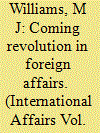| Srl | Item |
| 1 |
ID:
083991


|
|
|
|
|
| Publication |
2008.
|
| Summary/Abstract |
For the last two decades the US has pursued what some analysts have called the 'fantastical idea' of military transformation that would enable the US to change the very nature of war. Known as the 'revolution in military affairs', this process would use technology to provide the US with battlefield dominance that no opponent could overcome. Motivated by the politics of the Cold War, however, this exit from reality has proved less than effective in what has become known as the 'war on terror'. The US has been pulled into nasty, 'small' wars, against enemies utilizing asymmetric tactics. The Bush administration has tried to destroy these groups through the use of military force, failing, or even worse refusing, to recognize that these enemies feed off the economical, political and social rot of weak and failing states. For the last eight years the US government has addressed the symptoms of a problem rather than the actual disease. If America wants to make serious progress with the most pressing national security risks, the next American president must enact a revolution in foreign affairs that sees a massive overhaul and substantial investment in the State Department and USAID. A critical mass of research exists to illustrate the links between development and security-it is time Washington gets serious and embraces a conception of security that is more holistic, and ultimately, more effective.
|
|
|
|
|
|
|
|
|
|
|
|
|
|
|
|
| 2 |
ID:
081706


|
|
|
|
|
| Publication |
2008.
|
| Summary/Abstract |
This article assesses the presidency of Taiwan's Chen Shui-bian from 2000, when he was elected the first non-Nationalist Party (Kuomintang or KMT) president to the present. Chen enjoyed broad support at home and abroad, but that soon changed. Three criteria are used to assess his presidency: governance (including political reform), the economy, and his handling of foreign and defense policy. The article concludes that while Chen faced a difficult situation, including having a weak mandate and a legislature controlled by a hostile opposition, he failed to show leadership and resorted to exploiting ethnic tensions. Gridlock resulted. Chen meanwhile saw economic decline and deteriorating relations with the United States and China. Finally, Chen succumbed to corruption. In short, Chen's presidency was a failed one.
|
|
|
|
|
|
|
|
|
|
|
|
|
|
|
|